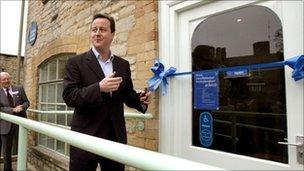Spending cutbacks hit Citizens' Advice service
- Published

David Cameron, then Conservative leader, opened a new CAB office in Witney, Oxfordshire, in 2007
Cuts in local government spending have led to fewer people being able to use the services of the Citizens' Advice Bureax (CAB), the charity has said.
The CAB for England and Wales said its local offices suffered an average 10% cut in funding in April.
As a result, they have advised 7% fewer people in the four months between April and July than they did a year ago.
The CAB said these cuts were just the beginning and that there was much worse to come.
"We are having to cut back on advisers and this means we are cutting back on the number we can see as we operate at pretty much full capacity all the time," explained Mike Dixon, the assistant chief executive of CAB.
Funding shortfall
Nearly half of the funding for CAB offices comes from local authorities, and this is where the CAB is currently experiencing most of its reduced funding.
But the advice network said it was now having to plan for cuts in the money it receives from the Legal Services Commission to provide legal aid.
It is also expecting a further shortfall, once the short-term replacement for the government's Financial Inclusion Fund comes to an end.
That fund had provided extra cash for the CAB's debt advice service for several years and was due to be shut off at the end of the last financial year.
At very short notice, the funding was extended just for 2011-12, but with no promise of funding thereafter.
'Slashed'
In the last financial year, the legal aid contract provided nearly 15% of CAB funding in England and Wales, while the Financial Inclusion Fund provided nearly 10%.
CAB chief executive Gillian Guy said: "Just when people need us most, many bureaux have had their own funding slashed and have been forced to cut back their frontline services to the public as a result."
The CAB in England and Wales advised more than two million people in the last financial year, at about 3,300 offices.
Problems with debts, benefits and tax credits amounted to nearly two-thirds of its workload, which has risen by 18% in the past two years.